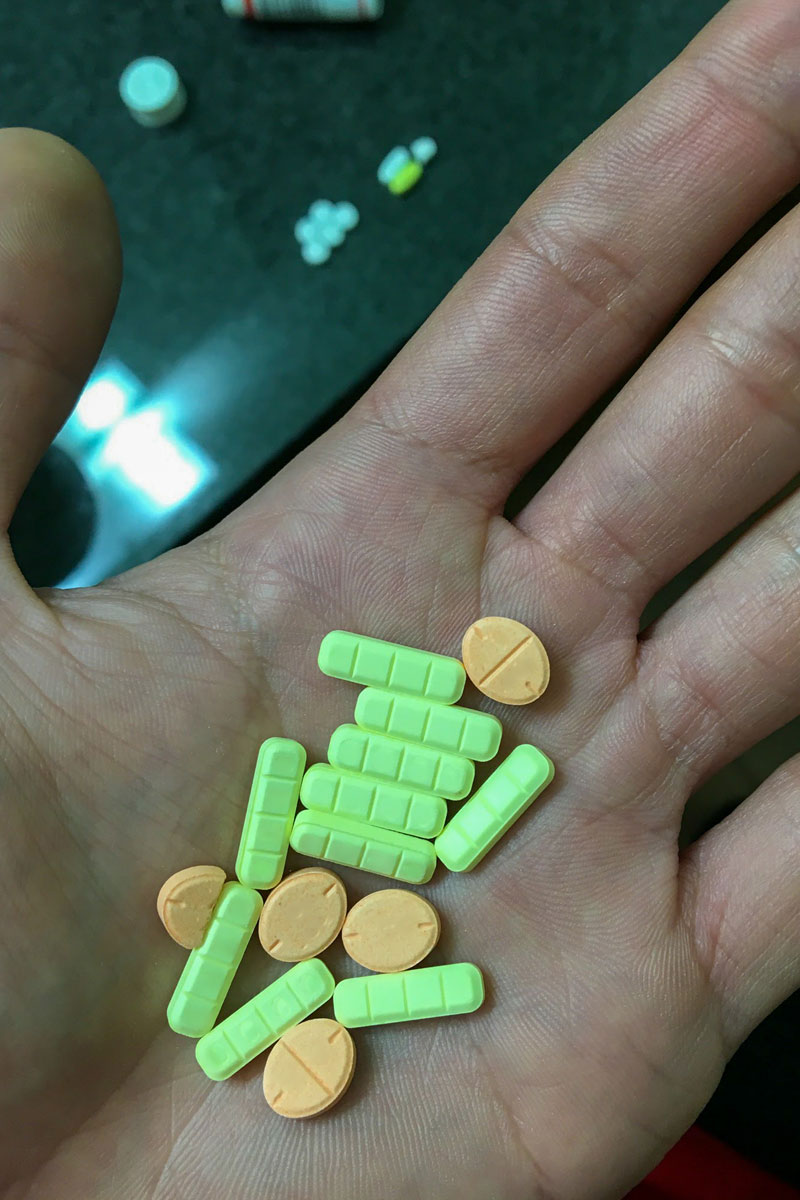Antidepressants
For those suffering from severe depression, or those that have a combination of anxiety and depression, antidepressant medications, like fluoxetine, citalopram, sertraline, paroxetine, and escitalopram, are often prescribed as a way to address both. These medications are classified as selective serotonin reuptake inhibitors (SSRIs), which build up and slowly release in your system over the time that you take them in an attempt to regulate serotonin levels in the brain. These daily maintenance medications create a reservoir of the active ingredients in your system that must be maintained daily.
A significant problem with antidepressants is having to constantly stay on a regimen to see any results. If you skip a day or stop taking your prescriptions, all your previous headway in creating the intended serotonin reservoir is lost. Meanwhile, due the way SSRIs artificially boost serotonin retention, your brain can no longer manage these levels on its own. Adverse side effects are common and can make managing your condition exponentially harder than before. In most scenarios, the prescriptions provided can cause your symptoms to worsen instead of improving. Worse, withdrawals or discontinuation syndrome can set in quickly after you stop taking them, keeping you locked in a cycle of prescription medications.
Anti-Anxiety Medication
Common anti-anxiety medications, namely clonazepam, alprazolam, and lorazepam, are all forms of benzodiazepines used to limit anxiety-induced behaviors like panic attacks. These drugs, in contrast to antidepressants, are used as a form of quick relief for these sudden rushes of
anxiety. They attempt to bring down the person taking the meds to a neutral, non-reactive state; however, these medications can increase a feeling of emptiness in the user, which can contribute to feelings of depression and suicidal ideation.
In long-time users, the dosage needed to reach this relief can increase as you build up a tolerance level to the substance, which can only increase negative side effects. Overall, both antidepressants and anti-anxiety medication are not guaranteed to be effective in all users, and because of common adverse side effects, they can end up being less helpful than other forms of treatment.1
How Do Suicidal Thoughts Take Shape?
Suicidal thoughts, or suicidal ideation, can occur in many forms and for various reasons. Depending on the circumstances, studies surrounding the development of suicidal thoughts have opened up a wider array of scientific data on what causes these thoughts to occur. Suicidal ideation is the overarching category of behaviors that can be attributed to those that make an individual feel like suicide is a necessary option for them.
Suicidal thoughts, which go hand in hand with suicidal ideation, are the manifestations of these ideas in those suffering from suicidal ideation and can lead to drastic consequences if acted upon. Suicidal thoughts are a subcategory of the overarching suicidal ideation, which encompasses other behaviors relating to suicide, such as self-harm.
Depression can cover a wide array of mood disorders, and each has a wide array of symptoms and side effects. On average, 60% of those with suicidal thoughts or who are at risk for suicidal ideation suffer from a depression-related mood disorder.2
For a long time, an imbalance in brain chemistry was purported to cause depression, and antidepressants were prescribed to treat this imbalance. However, that theory has never been proven, and medications can make functioning with mental illness extremely difficult for some to manage.
Instead, the most common contributors to depression and suicidal ideation continue to be:
- Anxiety and other mental health disorders
- Physical illness
- Trauma
- Substance use, including psychiatric medication
Anxiety-Related Disorders
For those suffering from anxiety-based disorders, the stress brought on by daily activities, along with the anxiety-related disorder, can cause an increase in suicidal thoughts. These thoughts can manifest from a need for control over one’s own life or as a way to decrease stress and panic from everyday routines. In fact, of all individuals reporting a suicide attempt, over 70% suffered from an anxiety disorder.3
For some panic disorders, such as post-traumatic stress disorder (PTSD), suicidal ideation is intensified by a link to both impulsive behaviors and anger stemming from their trauma and traumatic flashbacks. In these instances, the stressfulness of life tends to be too much for someone with one of these disorders, and suicide seems to be the only option for ending their stress. Again, medications meant to restore chemical balance may lead to an increase in suicidal thoughts.
Trauma
Researchers have long noted that traumatic events seem to be interlinked with mental health issues. Those who have experienced trauma, whether from an unstable childhood or a traumatic event as an adult, are more likely to encounter mental illness later in life. Complex trauma from physical abuse, sexual abuse, loss of a parent, natural disasters, war, automobile accidents, and more, can give rise to other mental health issues, especially PTSD.
Constantly reliving past trauma in the form of PTSD leads many survivors of trauma to look for a “way out” of this cycle. For some, that takes the form of substance use and misuse. For others, suicide is viewed as a means of escape. Over 10% of young adults with PTSD report having attempted suicide, compared to 5% of non-trauma exposed individuals. The number of individuals who have experienced suicidal ideation without an attempt is likely higher.4
Physical Illness

For some, the diagnosis of a long-term or terminal physical illness can be the source of suicidal thoughts. Although somewhat grim, coping with a crushing diagnosis like this is very hard, and for some, the possibility of life with these new restrictions does not seem feasible. Thought of as a release from their physical ailments, suicidal thoughts can stem from feeling like death is the only way to be free from their illness.
Especially concerning terminal diagnoses, the root causes of suicidal thoughts among those with physical illnesses are coming from a place of relieving suffering. Statistically speaking, those that suffer from a disability, especially multiple disabilities, are more likely to experience depression, suicidal thoughts, and suicide planning. Worse, some of the medications used to treat chronic illness and disabling conditions can serve to further influence suicidal thoughts.5
Recreational Drugs and Prescription Medication
The use of chemical substances has long been linked to an increase in depression and suicidal ideation. An estimated 40% of all people entering treatment for substance addiction have had a previous suicide attempt, and even more struggle with suicidal thoughts. Unfortunately, the Black Box labels present on prescription psychiatric medication indicate that prescription drugs are another frequent contributor to depression and suicide.6
As mentioned above, psychiatric medications appear to be the root cause of some suicidal thoughts. As a listed side effect, those prescribed antidepressants or anti-anxiety medications can have adverse reactions to these medications, which can overall increase their likelihood of developing worsening mental health symptoms.
Similarly, after stopping the use of antidepressants or anti-anxiety medication, withdrawal symptoms can develop, leading those previously on these medications more likely to develop strong, serious side effects, like suicidal ideation. Overall, adverse reactions to SSRIs and other psychoactive medications have been shown to cause an increase in suicidal thoughts and suicidal ideation at least 5% more often than a placebo.
Although this data has since been dismissed by pharmaceutical companies, researchers now believe the numbers could be even higher than reported, as many suicide attempts were either dismissed, falsely attributed to the placebo, or negated due to timeline inconsistencies.7
Mental wellness and mental health are critical considerations, especially when it comes to harm and harming oneself. Suicidal thoughts are sometimes thought of as a part of being depressed, but the origin of these thoughts can stem from ineffective treatment plans, like prescription medication. Being able to find the right treatment plan for your particular needs and feelings is essential to the healing process. Relying on medication that is not guaranteed to help alleviate your symptoms and can risk making side effects worse can be detrimental to your mental and physical health.8












